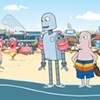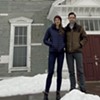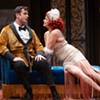Published July 5, 2006 at 2:49 p.m.
There's no rule stipulating that summer entertainment must be light and fluffy. Yet every year, the season seems to conspire against leveling a critical gaze at the culture. That's true on the nation's movie screens, and it's largely true on Vermont's theater stages -- witness the number of musicals in the calendar.
The current production of the Middlebury Actors Workshop isn't one of them -- not by a long shot. Under the direction of Melissa Lourie, the MAW ensemble has staged a program of four short plays offering nothing less substantial than a meditation on life and death. The beauty of the playbill, however, is its balance of heavy and light, serious and silly.
Each play is, in its own way, absurd. There's Samuel Beckett's Krapp's Last Tape, in which a single character listens obsessively to a tape-recorded diary entry he made of himself 30 years earlier, when he was 39. In David Ives' popular Variations on the Death of Trotsky, Russian revolutionary Leon Trotsky discusses with his wife how improbable he finds the news of his murder -- this despite a mountain-climber's axe protruding from his head. Rosa's Funeral, by Richard Strand, is essentially a monologue-eulogy delivered by a hippie chick -- directly addressing God -- on the occasion of finding a dead animal by the roadside. And in John Patrick Shanley's The Wild Goose, three dead people ponder, among other things, their emotional connections as friends while they intermittently die, revive and carry on with life in the afterlife.
While death isn't the occasion for the story in Krapp's Last Tape, as it is in the other three works, the play hits the most somber notes. Perhaps because Krapp's theatrical universe is unmarked by elements of outright fantasy, the absurdity of his situation rings as a verity of the human condition: that pivotal moments of a lifetime, if relived many years later, may inspire regret.
Regret isn't the only emotion Krapp experiences when listening to "box three, spool five," but the intensity with which he attends to his recorded words suggests a question in the old man's mind about how he has lived his life. Although no one speaks back to Krapp, he's engaged in a communion of sorts that borders on ghostly. What also gives the play its distinctly Beckettian touch of the absurd is the extent to which Krapp appears to have withdrawn into his private sanctuary. He discloses into the microphone while making a recording -- presumably his last, hence the title -- the extent of his hermitage, along with other points that give this play its philosophical weight.
The sense of detachment that defines Krapp's relationship to the rest of the world is enhanced by MAW's choice of venue, the A.R.T. Studio Theater at the Hannaford Career Center. The unadorned black-box space is appropriate for plays that mine drama not from conventional linear plots but from their conceptual premises -- be they introspective or inventively playful. Spare production values evoke a sense, in each play, that the world fades out or drops off at the stage boundaries.
This is not to say that acting is upstaged by ideas in these works. On the contrary, Cyrus Moore's turn as Krapp presents him with the challenge of stringing together nearly an entire play's worth of reactions to someone else's words. As a result, his own lines take on great importance for being so infrequent. Moore shines in this role -- if shine is the appropriate term for an impressive repertoire of perplexed and just plain annoyed looks. He wrings a wide range of emotion from facial gestures alone and, with a single sigh as he slumps into his chair, conveys a palpable world-weariness. Overall, Krapp embodies this idiosyncratic loner convincingly, and manages to draw a few laughs along the way.
The same trio of MAW players handles all roles in the three-character Variations on the Death of Trotsky and The Wild Goose. The former is a cleverness tour de force, both in concept and in language, calling on its players to execute the work with sharp comic timing and sense of irony. Harry McEnerny turns in a nicely understated Trotsky in a comedy written rather broadly in spots -- there's that hatchet in his head, after all. McEnerny's wry manner contrasts comically with an outrageous predicament he finds at times befuddling and at others borderline profound. Imagine, his death at the hands of a Communist!
In The Wild Goose, McEnerny, Karen Lefkoe and Mike Kiernan share the burden more or less equally. This lively, chatty play offers the greatest level of character interaction, and while the action also quickens -- McEnerny's character pulls out a pistol and shoots a couple of things -- the focus remains on ideas, musings and questions. Sometimes the questions are big: Is yearning the essence of being alive? And sometimes small: Why did you hurt my feelings? Throughout Wild Goose, a sense of genuine friendship gathers among these characters. That bond is strongest between McEnerny's Jameson and Kiernan's Renaldo -- Kiernan plays to humorous effect the more sensitive of two friends both a little down on their luck.
The most memorable moment of the lighter works comes from Lefkoe in Rosa's Funeral. Presiding over an animal's roadside funeral, wearing cut-off jeans shorts and a T-shirt bearing a heart design, she affects sorrow and hysteria from one beat to the next. This brief piece doesn't delve too deeply into the meaning of life and death, but its comic punchline of an ending, well delivered by Lefkoe, strikes an absurd note about the relativity of human values about life.
By the program's end, Krapp's Last Tape and the other works cohere into a bit of theatrical pondering that's well leavened from play to play, yielding an enjoyable mix of substance and style. It's just provocative enough to be serious drama -- and just silly enough to be summer theater.
More By This Author
Speaking of...
-

Executive Director Kurt Thoma Leaves Barre Opera House
Mar 5, 2024 -

Vermonter's Musical Bound for Broadway With Hillary Clinton as a Producer
Oct 25, 2023 -

Phantom Theater Finds New Winter Venue in Waitsfield
Oct 13, 2023 -

Double E 2023 Summer Concert Series Kicks Off With the Wailers
Mar 17, 2023 -

Off Center for the Dramatic Arts to Reopen in the New North End
Sep 23, 2022 - More »
Comments
Comments are closed.
From 2014-2020, Seven Days allowed readers to comment on all stories posted on our website. While we've appreciated the suggestions and insights, right now Seven Days is prioritizing our core mission — producing high-quality, responsible local journalism — over moderating online debates between readers.
To criticize, correct or praise our reporting, please send us a letter to the editor or send us a tip. We’ll check it out and report the results.
Online comments may return when we have better tech tools for managing them. Thanks for reading.














































